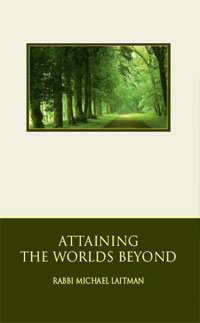A Screen that Rejects the Creator’s Light
All the words of Kabbalah and all the advice it provides are concerned with only one issue: how we can reach the Creator and unite with Him. All our deficiencies stem from our inability to sense the greatness of the Creator. Having just begun to aspire to come closer to Him, we already want to experience Him in our senses.
But this is impossible until we have a screen (masach) that refuses the Light of the Creator. This exists as long as we do not have vessels of bestowal. And as long as we do not have these qualities of bestowal, we are only able to have a feeling of the Creator from afar, which is called “Surrounding Light,” which can shine from afar on who is still distant in qualities from those of the Creator.
The Surrounding Light is always greater than the Inner Light, which is gained through the help of a screen, given that one possesses certain altruistic qualities. The Surrounding Light is the Creator Himself, while the Inner Light (the soul) is only that “part” of the Creator that an individual can acquire after improving one’s own qualities to a certain degree.
Everything That Happens Is an Act of God
So how can we receive the Light of the Creator when we have not yet repaired our dispositions? The answer is simple: only by intensifying the illumination of the Surrounding Light. In other words, we will achieve this only by increasing the exaltedness and importance of the Creator in our eyes by constantly yearning to sense the Creator as the Source of all existence and everything that is done.
We must understand that everything that happens to us is an act of God, and that there is nothing in the world other than Him. All of our efforts should be concentrated on this: to not think that what happens to us is through chance, or fate, or a consequence of our prior actions, or the will of others. We must exert ourselves not to forget the Creator.
“Pharaoh” Is the Egoism in a Person’s Heart
Under no circumstance should we interpret the text of any section of the Bible (The Five Books of Moses) according to our own perceptions, likening the description of events to the events in our own world.
For example, as I have written in my previous books, “the evil Lavan” mentioned in the Bible is the highest level of the soul being filled with the Light of the Creator. “Pharaoh” is a symbol of the totality of our egoism.
A further example can be found in the Passover Haggada (story) on the exodus from Egypt, from the spiritual captivity of Pharaoh—our egoism. “Pharaoh died”—finally the person sees that his egoism is not for his good, that it kills him, and obligates him to serve it all of his life. This principle now, in his eyes, “dies.” And as long as he does not recognize that his egoism is his sole enemy, he thinks that his life and servitude in Egypt (captivity to the desires of the body) was a good and favorable condition. And even afterwards, occasionally (during spiritual downfalls) he cries for the “plates of meat and bread” that he had in Egypt, namely, that served his egoism in abundance.
As long as Pharaoh (the egoism in the heart of a person), the king (who ruled over all the thoughts and desires of a person) of Egypt was alive, he dictated against the person’s will what all of the person’s desires and actions would be. This person is said to be found “in the exile (imprisonment) of Egypt,” captive to various egoistic desires (mitsraim deriving from the words mitz-ra—”a concentration of evil”).
Help From the Creator Comes Unexpectedly
We, ourselves, are not able to understand that the nature that rules over us is bad. And this is only as long as the Creator has not yet created good for the person of “And behold, Pharaoh died.”
He gives us those life experiences that allow us to recognize that egoism is our enemy. Only then will this symbol of evil die, and we will feel that we are incapable of existing as we once did, working for nothing.
And “the sons of Israel groaned because of the servitude and they cried out”—they did this only after realizing they were not even able to move without some egoistic benefit for themselves, and had not yet gained a spiritual, altruistic nature.
“And their cry for help from their servitude rose up to God, and God heard our voice”—this occurs only if one truly cries out from the very depths of the soul, and this is possible only if the person reached the outermost limits of patience and suffering.
Only then does the Creator send help, and this help always arrives unexpectedly. An individual can never know in advance which tear will be the last one; all tears should be shed as if they were the last. As for the help of the Creator— “yeshuat haShem keheref ay’in“—it appears suddenly and always unexpectedly!
 “How Kabbalah Helps a Person Unite with the Creator” is based on the book, Attaining the Worlds Beyond by Dr. Michael Laitman.
“How Kabbalah Helps a Person Unite with the Creator” is based on the book, Attaining the Worlds Beyond by Dr. Michael Laitman.






